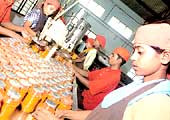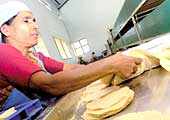 |
| Chordia Food Park's P. Chordia: Incubating
foodie entrepreneurs |
Till
not too long ago Anita Khabia was another humble Pune housewife,
renowned only amongst her friends' circle for her lip-smacking
Kolhapuri Thecha, a traditional, fiery garlic chutney. Then one
fine day Khabia put together a business plan, to package and sell
the blistering paste, and sent it (the plan not the Thecha) to
Pradeep Chordia, promoter of the 120-acre Chordia Food Park, 50
km from Pune in Maharashtra's Satara district. Khabia's company,
Mona Enterprises, was soon on its way. The product, which has
been on the market since early this year, is doing an average
monthly turnover of Rs 6 lakh.
The 43-year-old Khabia is one of the 12 "tiny"
entrepreneurs housed in the Chordia Food Park, along with two
other "small" businesses. Tiny are those entrepreneurs
whose investment in plant and machinery is below Rs 10 lakh, whilst
small are those who've put up between Rs 10 lakh and Rs 1 crore.
The excitement is palpable as Chordia whisks this correspondent
from unit to unit, some fully functional, some under construction,
pointing to what already exists and then moving excitedly to detail
what is to come. Standing at a potato warehouse where the temperature
is maintained at 4 degrees, he immediately points a few metres
away to an upcoming warehouse which will have sub-zero degree
storage facilities.
Chordia's model is as straightforward as
it is unique: Entrepreneurs send him business plans, or alternatively
he himself hand-picks budding businesspersons to execute proposals.
The food park provides the infrastructure, which has been set
up with an investment of Rs 16 crore, half of which came from
the Chordia Group's internal resources. The entrepreneurs then
sell their products to group company Chordia Foods, which markets
them via its retail outlets. The plan is to have 15 such outlets
in Pune shortly.
 |
| Ticking your tastebuds: Workers at a
picking plant in Shirwal in Maharashtra |
Along with Mona Enterprises, the other "tinies"
that catch the eye if you drive through the dirt-tracks of the
Chordia Food Park are Dishant Enterprises, Asha Enterprises, Rokdoba
Enterprises and Sur Enterprises, each a single-room unit, with
the name painted above each door, through which young owner-managers
in lab coats and caps flit in and out. Sur Enterprises produces
and markets synthetic syrups; Asha Enterprises, promoted by 25-year-old
Milind Rane-a BTech in Food Technology from Amravati University-produces
a gulab jamun mix. His neighbour Pradeep Tambe, a graduate in
Chemistry and Analytical Technology from Pune's Bhartiya Vidyapeeth,
has opted for custard powder and a strawberry milkshake mix. Both
were supervisors at Chordia Foods until they were hand-picked
for incubation at the Food Park.
Recognising the potential of the food park
model, the Small Industries Development Bank of India (SIDBI)
has decided to designate Pune as its first ever food cluster (as
it has for several other industries) as a first step towards channelising
a $120-million (Rs 528-crore) grant from a World Bank consortium.
"When a number of units are clubbed together this way, we
get economies of scale, lower administrative costs on loans and
can also arrange for a common marketing agency since that is a
big bottleneck for entrepreneurs," points out P. Rudran,
Chief gm (Western Zone), SIDBI.
| Processed Foods: The Next Big Thing? |
| »
Retail FDI waits in the wings: The biggest impact
will be on the food sector with an alignment of the supply
chain, once global retail behemoths make an entry in the country
» The
Prime Minister has already indicated that the trigger for
retail FDI could well be the food segment
» The
total tax burden on processed foods is down from 39 per
cent to 4 per cent after the abolition of excise duty and
institution of VAT at 4 per cent (down from 12.5 per cent)
in most states
» The
amendment of the APMC Act means that private parties can
procure directly from farmers; this is seen as a precursor
to the opening up of contract farming
» India's
share in agri products segment worldwide is currently a
paltry 1.6 per cent of a $520-billion (Rs 22,88,000-cr)
industry
» Indian
corporates like ITC are already investing in excess of Rs
200 crore in this segment every year. Hindustan Lever and
Godrej Industries are also betting on this segment
» An
investment of Rs 92,000 crore is expected to be pumped into
this segment in the 10th Five-Year Plan
|
The Chordia Food Park in many ways is a miniaturised
universe of the Rs 46,000-crore Indian food processing industry,
which is growing at 10 per cent per annum (for primary processing
and 15 per cent for value-added foods) and which, after it services,
could well be the Next Big Thing to be exported out of India.
Currently India's agri-exports account for just 1.6 per cent of
$520 billion (Rs 22,88,000 crore) of global trade. "India
still exports largely raw and unprocessed agri-produce and that
has to change, with a move towards value-addition and branding.
Also as distribution changes and larger retail formats come into
the picture, as is starting to happen in India, it's a logical
fit for the growth of processed foods," says Sonal Shah,
Director and Head of Strategic Advisory, Rabo India. Adds Suvalaxmi
Chakraborty, Head of Rural Micro Banking and Agri Business Group,
ICICI Bank: "I see a future in outsourced agri-processing.
For instance, companies in Tamil Nadu and Karnataka grow, process,
pack and export gherkins to buyers overseas; this will be a growing
trend."
Let's not forget the huge potential in the
Indian market itself. "We believe we are at an inflection
point on the processed foods segment. Currently just 8 per cent
of all agri (food) produce is processed in India; this should
touch about 15-20 per cent by 2010 and 35 per cent by 2025,"
adds Chakraborty. That's why megacorps like Hindustan Lever, ITC
and the Godrej Group are betting big time on this segment.
 And
then there's Chordia Food Park, with a promoter who's driven by
two die-hard convictions: One, that there's a huge potential that's
waiting to be unlocked in the food processing sector. "Think
what was the case with milk and milk products 30 years ago and
where are we today-it's all packaged milk, cheese, butter, tetrapaks,
ice creams vis-à-vis having cows in the backyard; the same
thing will happen for fruits and vegetables. Besides, processed
foods will always work out cheaper than fresh produce." Chordia
gives the example of the recent Mumbai floods, a period during
which prices of vegetables like tomatoes could have easily shot
up. "They could have gone up to Rs 60 per kg; just think
what tomato puree in tetrapaks could save the consumer,"
he points out, adding that processed fruits and vegetables account
for just about 2 per cent of the total domestic consumption currently
and this is expected to touch 10 per cent by 2010. And
then there's Chordia Food Park, with a promoter who's driven by
two die-hard convictions: One, that there's a huge potential that's
waiting to be unlocked in the food processing sector. "Think
what was the case with milk and milk products 30 years ago and
where are we today-it's all packaged milk, cheese, butter, tetrapaks,
ice creams vis-à-vis having cows in the backyard; the same
thing will happen for fruits and vegetables. Besides, processed
foods will always work out cheaper than fresh produce." Chordia
gives the example of the recent Mumbai floods, a period during
which prices of vegetables like tomatoes could have easily shot
up. "They could have gone up to Rs 60 per kg; just think
what tomato puree in tetrapaks could save the consumer,"
he points out, adding that processed fruits and vegetables account
for just about 2 per cent of the total domestic consumption currently
and this is expected to touch 10 per cent by 2010.
 Chordia's
second abiding belief is that entrepreneurship is the most effective
way to ride the processed foods boom. And that faith isn't without
foundation. After all Chordia's business itself has its roots
in home-grown entrepreneurship. Chordia Foods was set up by Pradeep
Chordia's parents who had made a modest start in 1962 when they
started selling home-made spices/masalas under a company called
Pravin Masale (his father was a helper in a grocery shop) and
slowly built the business to include pickles, papads and ketchup
(various products which go under the brand names of Pravin, Navin
and Toofan). The group today clocks a turnover of close to Rs
80 crore and is now readying for its next big growth spurt with
its own retail outlets. Chordia's
second abiding belief is that entrepreneurship is the most effective
way to ride the processed foods boom. And that faith isn't without
foundation. After all Chordia's business itself has its roots
in home-grown entrepreneurship. Chordia Foods was set up by Pradeep
Chordia's parents who had made a modest start in 1962 when they
started selling home-made spices/masalas under a company called
Pravin Masale (his father was a helper in a grocery shop) and
slowly built the business to include pickles, papads and ketchup
(various products which go under the brand names of Pravin, Navin
and Toofan). The group today clocks a turnover of close to Rs
80 crore and is now readying for its next big growth spurt with
its own retail outlets.
 The
advantages of being surrounded by entrepreneurs are manifold.
"We want to save costs by avoiding intermediaries,"
Chordia makes it clear. "For instance, in the case of custard
power alone, we save 40 per cent of costs by cutting out intermediaries."
Also, the way he sees it, food processing is a business best undertaken
and understood by entrepreneurs. "There is a great deal of
procurement activity involved in the food processing business
and getting into each individual procurement for the company is
not feasible," he explains. "Instead, the entrepreneurs
are responsible for their individual products and their procurement;
besides food is a very entrepreneur-driven business." The
mini-promoters on the park are on the same wavelength. "This
is any day better than working for a company. I can implement
my own ideas and set my own targets," offers Rane, who is
preparing for a demand offtake for his gulab jamun mix in the
coming festive season. "Last year I did sales of about 14
tonnes in the season, this year I am targeting 20 tonnes,"
he adds. He expects to do Rs 20 lakh worth of business this season. The
advantages of being surrounded by entrepreneurs are manifold.
"We want to save costs by avoiding intermediaries,"
Chordia makes it clear. "For instance, in the case of custard
power alone, we save 40 per cent of costs by cutting out intermediaries."
Also, the way he sees it, food processing is a business best undertaken
and understood by entrepreneurs. "There is a great deal of
procurement activity involved in the food processing business
and getting into each individual procurement for the company is
not feasible," he explains. "Instead, the entrepreneurs
are responsible for their individual products and their procurement;
besides food is a very entrepreneur-driven business." The
mini-promoters on the park are on the same wavelength. "This
is any day better than working for a company. I can implement
my own ideas and set my own targets," offers Rane, who is
preparing for a demand offtake for his gulab jamun mix in the
coming festive season. "Last year I did sales of about 14
tonnes in the season, this year I am targeting 20 tonnes,"
he adds. He expects to do Rs 20 lakh worth of business this season.
 |
| Dishing it out: Dishant Enterprises'
Pradeep Tambe (left) and Asha Enterprises' Milind Rane deal
in gulab jamun mix, and custard and milkshake powders |
Still, if the likes of Khabia and Rane have
to graduate into a bigger league, they will need a huge leg-up
from the government. And that could just happen with the Prime
Minister indicating that he will open up the food sector first
as a precursor to allowing retail FDI (foreign direct investment).
To be sure, large-format retail is a logical fit for processed
foods simply because retailers internationally are known to set
up cold chains. The growth of the processed foods industry would
also mean a growth in the number of buyers who want to buy produce
at the farmer's doorstep at a fixed price, possibly through contract
farming (currently not allowed), which, in turn, reduces the farmer's
complete helplessness in the face of severe fluctuations in the
market price of perishable commodities. As Dattatreya Raut, a
farmer in Shirwal, close to the Chordia Food Park, points out:
"Six months back I had to sell my entire onion stock at Rs
2 per kg, the rate is now Rs 10 per kg. Just think what a cold
storage facility could have done for me." Adds another farmer
in the vicinity, Vithal Chavan: "We need some kind of an
assurance on rates and offtake and then we can grow whatever commands
a premium in the market. Typically we are reduced to hawking our
produce between markets as far as Mumbai or Ahmedabad depending
on the rates offered and when the prices crash, we simply have
to sell at those prices to any taker. Fixed rates would make all
the difference." The good news, though, is that the Union
agriculture minister has just amended the APMC Act (Agricultural
Produce Marketing Committee), which restricted private players
from buying directly from farmers. Also, overall tax rates for
the processed foods business are down from an astronomical 39
per cent to 4 per cent in most states.
 |
| Bottling it up: Father-son duo Vishnu
Kumar Agarwal (left) and Vikas supply moulded plastic jars
to the units in the Chordia Food Park |
However, there's still plenty more that needs
to be done if the foods processing sector is to find its place
in the sun. Long-time industry observer K. Radhakrishnan, RPG's
Spencer's Retail VP for Merchandising, feels the domestic market
for processed foods is far from taking off. "We need a greater
push from entrepreneurs and companies in terms of understanding
the Indian market and bringing in the relevant intermediary technology
and I don't see that happening yet. Processed foods the way I
define it will take off only when it starts substituting the main
meal. The only category that has made a significant inroad is
juices, but that's an expensive product." What's needed clearly
are more people who think like Chordia, many more food parks like
Chordia's, and many many more entrepreneurs like Khabia and Rane
in the Chordia Food Park.
|






 And
then there's Chordia Food Park, with a promoter who's driven by
two die-hard convictions: One, that there's a huge potential that's
waiting to be unlocked in the food processing sector. "Think
what was the case with milk and milk products 30 years ago and
where are we today-it's all packaged milk, cheese, butter, tetrapaks,
ice creams vis-à-vis having cows in the backyard; the same
thing will happen for fruits and vegetables. Besides, processed
foods will always work out cheaper than fresh produce." Chordia
gives the example of the recent Mumbai floods, a period during
which prices of vegetables like tomatoes could have easily shot
up. "They could have gone up to Rs 60 per kg; just think
what tomato puree in tetrapaks could save the consumer,"
he points out, adding that processed fruits and vegetables account
for just about 2 per cent of the total domestic consumption currently
and this is expected to touch 10 per cent by 2010.
And
then there's Chordia Food Park, with a promoter who's driven by
two die-hard convictions: One, that there's a huge potential that's
waiting to be unlocked in the food processing sector. "Think
what was the case with milk and milk products 30 years ago and
where are we today-it's all packaged milk, cheese, butter, tetrapaks,
ice creams vis-à-vis having cows in the backyard; the same
thing will happen for fruits and vegetables. Besides, processed
foods will always work out cheaper than fresh produce." Chordia
gives the example of the recent Mumbai floods, a period during
which prices of vegetables like tomatoes could have easily shot
up. "They could have gone up to Rs 60 per kg; just think
what tomato puree in tetrapaks could save the consumer,"
he points out, adding that processed fruits and vegetables account
for just about 2 per cent of the total domestic consumption currently
and this is expected to touch 10 per cent by 2010. Chordia's
second abiding belief is that entrepreneurship is the most effective
way to ride the processed foods boom. And that faith isn't without
foundation. After all Chordia's business itself has its roots
in home-grown entrepreneurship. Chordia Foods was set up by Pradeep
Chordia's parents who had made a modest start in 1962 when they
started selling home-made spices/masalas under a company called
Pravin Masale (his father was a helper in a grocery shop) and
slowly built the business to include pickles, papads and ketchup
(various products which go under the brand names of Pravin, Navin
and Toofan). The group today clocks a turnover of close to Rs
80 crore and is now readying for its next big growth spurt with
its own retail outlets.
Chordia's
second abiding belief is that entrepreneurship is the most effective
way to ride the processed foods boom. And that faith isn't without
foundation. After all Chordia's business itself has its roots
in home-grown entrepreneurship. Chordia Foods was set up by Pradeep
Chordia's parents who had made a modest start in 1962 when they
started selling home-made spices/masalas under a company called
Pravin Masale (his father was a helper in a grocery shop) and
slowly built the business to include pickles, papads and ketchup
(various products which go under the brand names of Pravin, Navin
and Toofan). The group today clocks a turnover of close to Rs
80 crore and is now readying for its next big growth spurt with
its own retail outlets.  The
advantages of being surrounded by entrepreneurs are manifold.
"We want to save costs by avoiding intermediaries,"
Chordia makes it clear. "For instance, in the case of custard
power alone, we save 40 per cent of costs by cutting out intermediaries."
Also, the way he sees it, food processing is a business best undertaken
and understood by entrepreneurs. "There is a great deal of
procurement activity involved in the food processing business
and getting into each individual procurement for the company is
not feasible," he explains. "Instead, the entrepreneurs
are responsible for their individual products and their procurement;
besides food is a very entrepreneur-driven business." The
mini-promoters on the park are on the same wavelength. "This
is any day better than working for a company. I can implement
my own ideas and set my own targets," offers Rane, who is
preparing for a demand offtake for his gulab jamun mix in the
coming festive season. "Last year I did sales of about 14
tonnes in the season, this year I am targeting 20 tonnes,"
he adds. He expects to do Rs 20 lakh worth of business this season.
The
advantages of being surrounded by entrepreneurs are manifold.
"We want to save costs by avoiding intermediaries,"
Chordia makes it clear. "For instance, in the case of custard
power alone, we save 40 per cent of costs by cutting out intermediaries."
Also, the way he sees it, food processing is a business best undertaken
and understood by entrepreneurs. "There is a great deal of
procurement activity involved in the food processing business
and getting into each individual procurement for the company is
not feasible," he explains. "Instead, the entrepreneurs
are responsible for their individual products and their procurement;
besides food is a very entrepreneur-driven business." The
mini-promoters on the park are on the same wavelength. "This
is any day better than working for a company. I can implement
my own ideas and set my own targets," offers Rane, who is
preparing for a demand offtake for his gulab jamun mix in the
coming festive season. "Last year I did sales of about 14
tonnes in the season, this year I am targeting 20 tonnes,"
he adds. He expects to do Rs 20 lakh worth of business this season.
